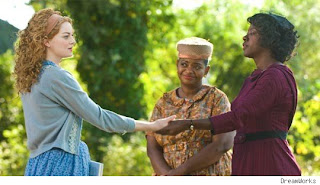the help: in which i attempt to quote karl marx and alison bechdel
 I was feeling skeptical about The Help for reasons articulated nicely by Raardvarks. It appeared to fall in a genre I call Slavery Is Bad—historical movies that let us feel good about taking the right side of an issue that was highly controversial in its time, which is kind of like betting on a race that’s already been run.
I was feeling skeptical about The Help for reasons articulated nicely by Raardvarks. It appeared to fall in a genre I call Slavery Is Bad—historical movies that let us feel good about taking the right side of an issue that was highly controversial in its time, which is kind of like betting on a race that’s already been run.
Not to mention the whole Black People Becoming Liberated Only With The Aid Of White People/White People Finding Themselves With The Aid Of Magical Negroes issue.
But while I was content to spend most of my undergraduate years being outraged by things I didn’t know anything about, I decided it might be interesting to actually see The Help before hating on it.
We went this afternoon with AK’s parents. AK’s mom spent many years working in a middle school cafeteria, and although working at a school in your own community is really different from working as a domestic in the Deep South, AK thought she might relate to this story of working class women of color standing up for themselves. But when we asked her what she thought of the movie, she said she liked it and “If I ever have a maid, I’ll be really nice to her.”
Which might say a thing or two about the point of view of the movie, which is ultimately budding white journalist Skeeter’s (though it’s somewhat disguised as maid Aibileen’s). The Help is a Slavery Is Bad Movie in which a white girl uses the stories of black women to further her career; in which black women don’t consider speaking out until she comes along. The villain, a snotty little racist played by Bryce Dallas Howard, is so absurdly villainous that any viewer who doesn’t kick puppies can congratulate herself on having a heart of gold.
But The Help is also a really well made, superbly acted movie about the risks people took behind the scenes of the Civil Rights Movement. The black women take the biggest risks by far, but Skeeter faces genuine consequences too. Refreshingly, the movie passes the Bechdel Test with flying colors, underscoring the power of gossip and other trivialized feminine behavior. And while it’s profoundly messed up to think that oppressed people need to be saved by those in power, the truth is that all social movements have benefitted from activists in all kinds of roles: the righteous oppressed, the sympathetic powerful, those who work within the system, the radicals who fight it. Didn’t Marx say something about the workers of the world needing wealthy allies?
Of course, the problem is that we hear a lot more stories about wealthy allies than the angry oppressed. AK said she read an interview with Kathryn Stockett, the author of the novel The Help, in which she seemed a little baffled by the success of the book and unconvinced that it was any kind of model treatise on racial justice. Usually I think it’s a cop-out not to own the politics of your own work. But I also get it—you tell the only story you can tell, and while you want it to mean something, it can’t mean everything.
So the real question isn’t so much why are we hearing Skeeter’s story, but why aren’t we hearing stories from real Aibileens? At the end of the movie, Aibileen tells us via voice over that her son always said there would be a writer in the family, and now she supposes it’s her. Except, at this point, writing has garnered Skeeter a publishing job in New York, and Aibileen is still living in poverty in Mississippi. So I guess that answers the question.



Comments
oxox